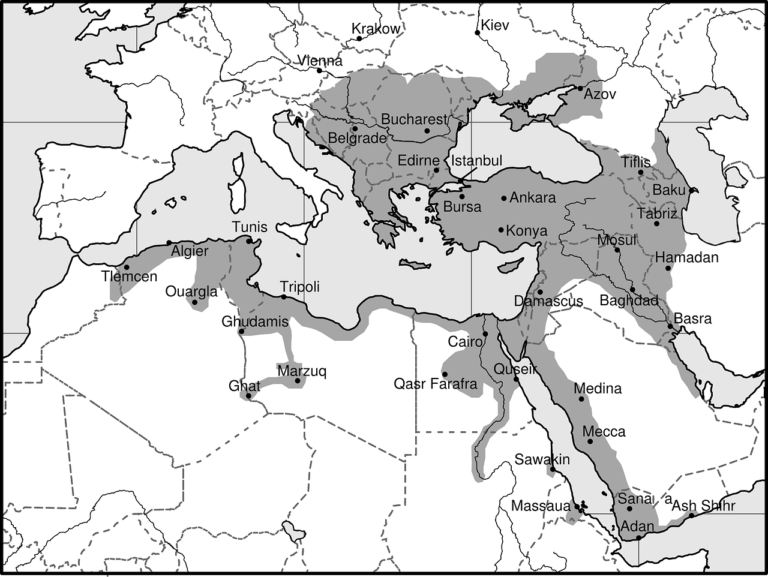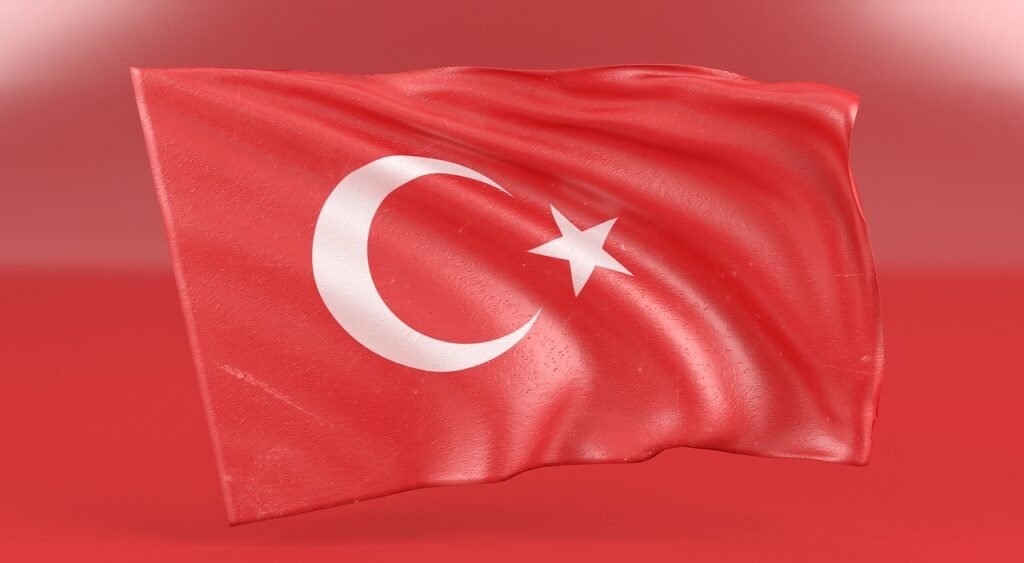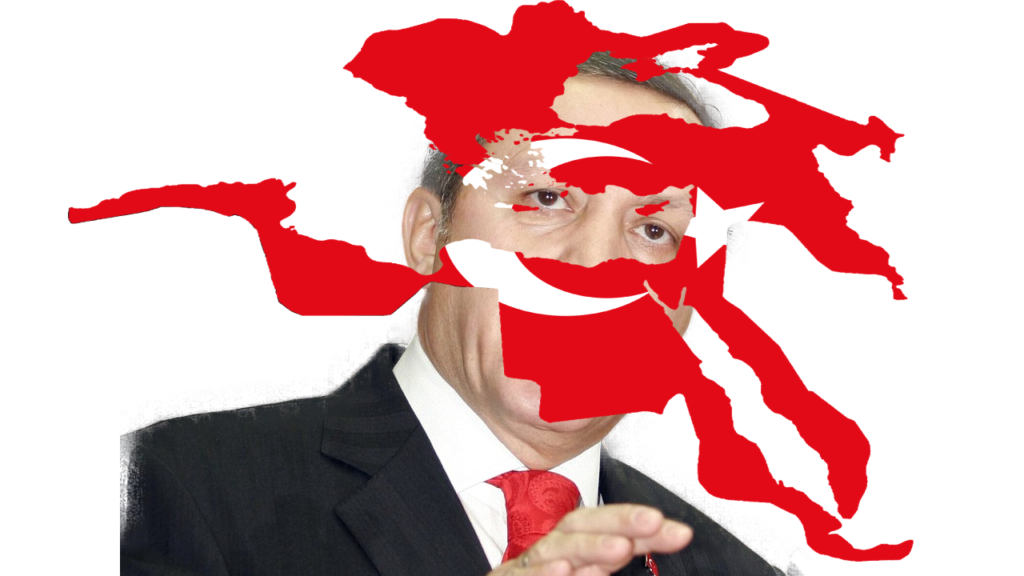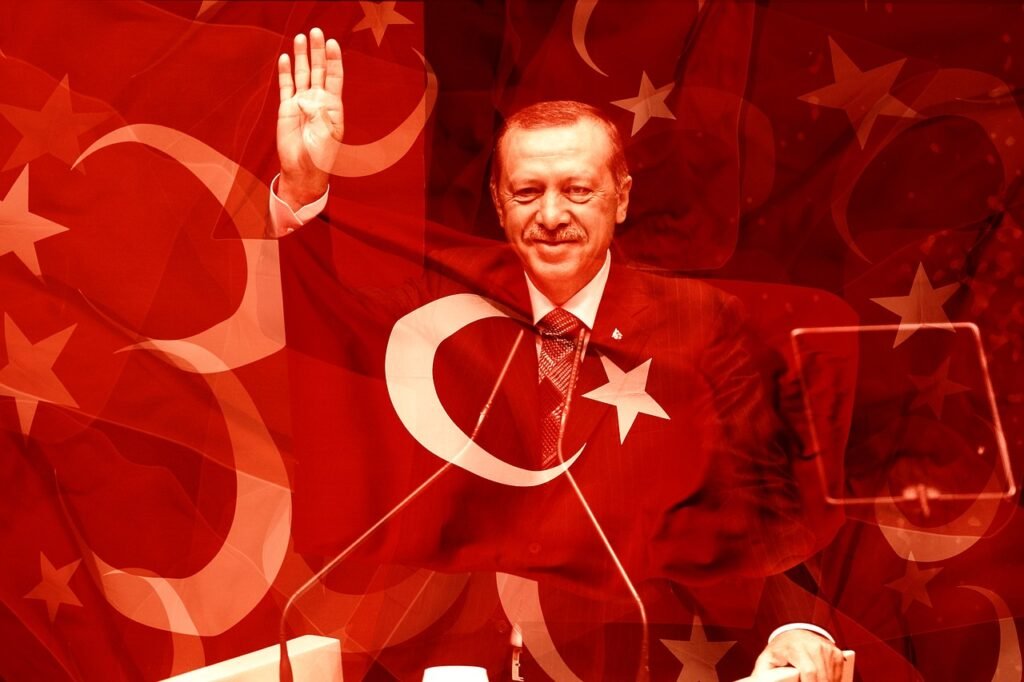Turkey strive to become a leader of the Islamic world. In 2022, the United Nations accepted a new name for Turkey as Türkiye, after Ankara requested the United Nations to change the name. President of Turkey Recep Tayyip Erdogan in support of the name change said, “word Türkiye represents and expresses the culture, civilisation, and values of the Turkish nation in the best way.”
Turkey is following an ambitious foreign policy to raise its stature at the global level and to project itself as the leader of the Islamic World, as was it in the times of the Ottoman Empire.
In this blog, we will analyse Turkish foreign policy from a prism of aspiration to become a leader of the Islamic World. We will start with some historical contexts and then we will move on to the Israel-Hamas war, an opportunity that Turkey is using to project itself as leader of the Islamic world.
Table of Contents
Ottoman Empire (Islamic)

The Ottoman Empire, founded in the late 13th century, emerged as a powerful and enduring state that spanned three continents. Osman I, the eponymous founder, established a small principality in Anatolia, which grew through military conquests and strategic alliances.
Under the leadership of Osman’s successors, especially Mehmed II, the Ottomans conquered Constantinople in 1453, marking the end of the Byzantine Empire. This event symbolized the expansion of Ottoman influence into the heart of the Byzantine realm and positioned them as a major player in the Eastern Mediterranean.
Over the next few centuries, the Ottoman Empire reached its zenith under rulers like Suleiman the Magnificent. Suleiman’s reign (1520-1566) saw territorial expansions into Europe, North Africa, and the Middle East. The Ottomans became a dominant force, controlling key trade routes and playing a significant role in shaping the geopolitics of the time.
However, by the late 17th century, the empire entered a period of decline marked by military setbacks, economic challenges, and internal strife. The 19th century witnessed efforts at modernization under the Tanzimat reforms, but the empire struggled to keep pace with the rapidly changing global landscape.
The 20th century proved tumultuous for the Ottomans. World War I saw their alliance with the Central Powers, resulting in defeat and the dismantling of the empire under the Treaty of Sèvres. Mustafa Kemal Atatürk led a nationalist movement in Anatolia, establishing the Republic of Turkey in 1923 and marking the formal end of the Ottoman Empire.
The dismemberment of the Ottoman Empire resulted in the creation of five new states – Syria, Lebanon, Transjordan, Iraq and Palestine.
Muslim brotherhood
The Muslim Brotherhood is a transnational Islamist organization founded in Egypt in 1928 to promote political Islam and implement Islamic law. It has branches and affiliated groups in several countries across the Middle East and North Africa. In 2011, during the Arab Spring, a series of pro-democracy uprisings across the Arab world, the Muslim Brotherhood played a significant role in various countries, including Egypt.
In 2011, Turkey, under the leadership of then-Prime Minister Recep Tayyip Erdoğan and his Justice and Development Party (AKP), expressed support for the Muslim Brotherhood and its affiliated movements in the Arab Spring events. The AKP saw the rise of Islamist political parties in the region as an opportunity to establish alliances with like-minded groups, believing that these parties could contribute to a more Islamist-influenced regional order.
Turkey’s support for the Muslim Brotherhood during the Arab Spring was part of a broader foreign policy shift known as “neo-Ottomanism,” seeking to revive Turkey’s influence in the former Ottoman territories. However, the outcomes of the Arab Spring were complex, and the Muslim Brotherhood’s rise to power in some countries, such as Egypt, was met with opposition from various quarters. In Egypt, the Muslim Brotherhood’s brief rule ended with a military coup in 2013, leading to a crackdown on the organization and its supporters.
The Turkish government’s support for the Muslim Brotherhood during the Arab Spring reflected a broader ideological alignment and a desire to foster political alliances in the changing landscape of the Middle East.
Rise of Pan-Turkism

The concept of pan-Turkism originated in the mid-19th century during a movement to unite Turkic people in Russia. However, its momentum waned with the collapse of the Ottoman Empire. Following the end of the Cold War and the USSR’s dissolution in 1991, Turkey revived its efforts to connect with the newly independent Republics of Turkish ethnicity.
In 2009, Turkey, Azerbaijan, Kyrgyzstan, and Kazakhstan formed the Council for Turkic States, which later evolved into the “Organisation of Turkic States,” with Uzbekistan joining in 2021. The geographical scope of pan-Turkism spans from the Balkans to the Great Wall of China, encapsulated by the slogan “Where there are Turks, there is Turkey.”
Erdogan has actively worked to bolster the organization, increasing trade with Central Asia to $10 billion and enhancing connectivity through the Caucasus region. Notably, Turkey and Kazakhstan signed a defence and security agreement. Turkey’s efforts extend beyond its immediate neighbourhood as it seeks to broaden its influence in various regions
Turkey, an opportunistic Country

Turkey was the first Muslim-dominated country to recognise Israel. Turkey and Israel have maintained cordial relations over the decades, with robust bilateral trade.
At the start of the Israel-Hamas war turkey took a neutral stance, but as Western countries backed Israel and Saudi Arabia and the UAE were silent spectators in the war, Turkey got an opportunity to support Hamas in the name of the religion.
Erdogan linked the Israel-Palestine conflict to a broader narrative of a clash between the Christian and Muslim worlds. This led to a significant deterioration in relations between Turkey and Israel. Both countries recalled their respective ambassadors, and Erdogan went as far as branding Israel a terror state and Prime Minister Netanyahu a war criminal. Notably, Erdogan refused to designate Hamas as a terrorist organization, despite its classification as such by the USA and EU.
The only prominent reason for Turkey to sacrifice its relationship with Israel is to project itself as a leader of the Muslim world.
Turkey in Sub-Continent
In November 2023, Turkey succeeded in having the newly elected President of the Maldives, Muizzu, choose Turkey for his inaugural official visit abroad. Turkey’s increasing influence in the Maldives, situated close to India, could potentially raise security concerns for India. In the previous year, 2022, marked a historic moment as the Turkish Foreign Minister made the first-ever visit of its kind to Sri Lanka and the Maldives.
Turkey’s unwavering support for Pakistan on the Kashmir issue serves as an example of Turkey not respecting India’s territorial integrity. President Erdogan has repeatedly raised the Kashmir issue at the United Nations. Upon analysing Turkey’s motivation for bringing up the Kashmir issue, it becomes evident that Turkey stands to gain little beyond the support of the Islamic Republic of Pakistan in its ambition to emerge as the leader of the Islamic world.
Conclusion
Turkey’s commendable endeavour to assert political leadership in the Islamic world is noteworthy, yet the sustainability of these efforts hinges on maintaining stable domestic politics and securing robust economic support.
Presently, Turkey faces economic challenges with a high inflation rate of 63%, and investors have withdrawn their investments from the country. In such a precarious economic situation, maintaining stable domestic politics becomes increasingly challenging.
Given the current economic difficulties, Turkey has a considerable distance to cover before achieving its goal of becoming a leader in the Islamic world.
